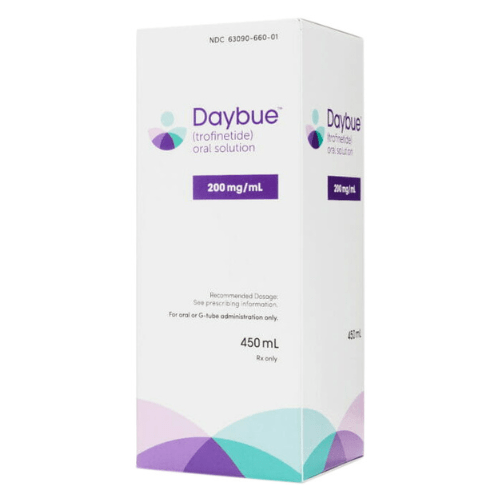
Daybue was approved by the U.S. Food and Drug Administration (FDA) on March 13, 2023 for the treatment of Rett syndrome in adult and pediatric patients two years of age and older. It is the first and only FDA-approved treatment for Rett syndrome. The approval was based on the results of two clinical trials that showed that Daybue improved motor function, communication skills, and social behavior in patients with Rett syndrome.
Manufacturer Details
Daybue oral solution is manufactured by Acadia Pharmaceuticals, Inc., a biopharmaceutical company based in San Diego, California. The drug is available in the strength of Daybue 200 mg/mL.
Indication Of Daybue
Daybue is indicated for the treatment of Rett syndrome in adults and pediatric patients two years of age and older.
What Is Rett Syndrome?
Rett syndrome, primarily affecting girls, is a rare, severe, and progressive disorder with noticeable signs emerging within the first two years of a child’s life. It can hinder essential developmental milestones, impacting abilities like speech, walking, eating, and breathing. While there is no cure for this lifelong condition, early intervention may assist in adaptive measures for the affected child.
Rett syndrome occurs in approximately 1 out of every 10,000 to 15,000 girls globally, with an even lower occurrence in boys. Rett syndrome, often caused by a mutation in the MECP2 gene on the X chromosome, is not inherited but arises as a chance mutation in DNA. The specific role of the gene in triggering the syndrome remains unclear, but researchers believe it influences various genes involved in development.
Mechanism of Action
The exact way by which Daybue works to treat Rett syndrome is not known, but it is thought to reduce inflammation and support synaptic function in the central nervous system.
Dosing Information and Administration for Daybue
Daybue is administered orally twice daily, in the morning and evening, with dosage determined by patient weight. The medication can be taken with or without food. Dosages are specified as follows:
- 9 kg to less than 12 kg: 5,000 mg twice daily (25 mL twice daily)
- 12 kg to less than 20 kg: 6,000 mg twice daily (30 mL twice daily)
- 20 kg to less than 35 kg: 8,000 mg twice daily (40 mL twice daily)
- 35 kg to less than 50 kg: 10,000 mg twice daily (50 mL twice daily)
- 50 kg or more: 12,000 mg twice daily (60 mL twice daily)
Daybue oral can be given through a gastrostomy (G) tube, and via a gastrojejunal (GJ) tube, it should be administered through the G-port. Use a calibrated measuring device for accurate dosage, obtained from the pharmacy. Dispose of any unused Daybue oral solution within 14 days of opening.
Drug Interaction
Daybue may interact with certain medications, including
- CYP3A4 substrates: Daybue exhibits weak inhibition of CYP3A4, potentially elevating the blood levels of medications metabolized by this enzyme. Caution is advised when using Daybue concurrently with orally administered CYP3A4 substrates, as even slight changes in substrate plasma concentration could result in significant toxicities.
- OATP1B1 and OATP1B3 substrates: Daybue may heighten blood levels of drugs acting as substrates for OATP1B1 and OATP1B3. To mitigate potential serious toxicities, it is recommended to avoid the simultaneous use of Daybue with medications falling under these transporter substrates.
Close monitoring of patients is essential in such combinations.
Usage in Specific Populations
Pregnancy:
There is no adequate information about the safety of Daybue in pregnant women. Daybue should be used during pregnancy only if the potential benefit justifies the potential risk to the fetus.
Lactation:
It is not known whether Daybue is excreted in human milk. Because many drugs are excreted in human milk, caution should be exercised when Daybue is administered to a nursing mother.
Pediatric Use:
Daybue is considered safe and effective for treating Rett syndrome in pediatric patients aged two and older. However, its safety and effectiveness have not been established in those under two years.
Geriatric Use:
No information is available on Daybue’s safety and efficacy in geriatric patients. Clinical studies did not include individuals aged 65 and older, warranting caution. Given Daybue’s renal excretion and potential age-related renal decline, monitoring renal function is advisable.
Renal Impairment:
No specific study assessed Daybue’s pharmacokinetics in renal impairment. Due to its predominant renal elimination, administering Daybue to those with moderate or severe renal impairment is not recommended.
Side Effects
The most common side effects of Daybue are:
- Diarrhea
- Vomiting
- Fever
- Seizure
- Anxiety
- Decreased appetite
- Fatigue
- Nasopharyngitis
If the patient experiences any side effects, it is recommended to contact their doctor immediately.
Other Information
Daybue should be stored in the refrigerator, within the temperature range of 36°F to 46°F (2°C to 8°C), and must not be frozen. Keep Daybue in an upright position, ensuring the child-resistant cap is tightly closed. To safeguard children, store Daybue and all medications out of their reach.
In case of a missed dose, follow the regular schedule without doubling doses. If vomiting occurs after administration, do not take an additional dose; continue with the next scheduled dose. For patients experiencing severe diarrhea, dehydration, or significant weight loss, consider discontinuing laxatives before starting Daybue. Discuss potential interruptions, dosage reductions, or discontinuation with healthcare providers in such cases.
How To Buy Daybue Online?
To buy Daybue online, contact SANSFRO or similar pharmaceutical procurement firms specializing in importing medicines from the US and Europe. For specific information tailored to the Indian market, reach out to the dedicated Patient Support Team at (+91) 93157 05373 or email help@sansfro.com. As for the Daybue price, various factors contribute to pricing, and for accurate and up-to-date information, contact the Patient Support Team for the latest details.
Conclusion
Daybue is a promising new treatment for Rett syndrome. It is the first and only FDA-approved treatment for this rare and debilitating disorder. Clinical trials have shown that Daybue can improve motor function, communication skills, and social behavior in patients with Rett syndrome. Daybue is generally well-tolerated and has a favorable safety profile. If you have any questions about Daybue, please talk to your doctor.
Reference



